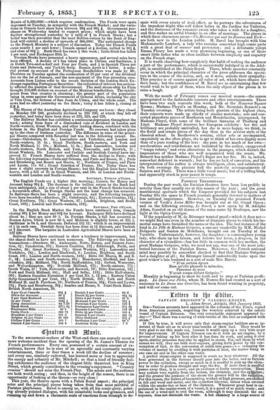thratrro ant Zuoir.
To the amusement-seekers of the West-end there can scarcely occur a more welcome incident than the opening of the St. James's Theatre for French performances. Every one, possessed of a certain amount of ex- perience, knows that he is sure of an agreeable and constantly varying entertainment, three or four times a week till the decline of summer; and every one, similarly endowed, has learned more or less to appreciate the energy and urbanity of Mr. Mitchell ; so that a kind of friendly feel- ing exhilarates the audience of the elegant little theatrical box in King Street, which greatly contributes to the evening's enjoyment. " Country .cousins" should not miss the French Play. The actors and the audience are both worth seeing ; and then, in the height of the season, there is an opportunity of looking at the Queen-so very close ! This year, the theatre opens with a Palais Royal aspect ; the principal actor and the principal pieces being taken from that most mirthful of Parisian playhouses. Ravel is among us, with all his comic glory, point- ing already pointed dialogue, with his inimitable looks and grimaces, and .running up and down a chromatic scale of emotions from triumph to de- spair with every nicety of droll effect, as he portrays the adventures of the impudent Wight who will follow ladies in the Jardins des Tuileries, and the distresses of the romantic swain who takes a wife for a daughter, and thus makes an awful blunder in an offer of marriage. The pieces in which these characters occur-Un Monsieur qui suit les .Femmes and York- are both new to the London public. M. Ravel has brought with him Mademoiselle Lambert, a lady who sustains somewhat high comic parts with a great deal of manner and pretension ; and a debutante yclept Emma Fleury has made a very promising beginning, as one of those smart little ladies who so often oscillate between simplicity and coquetry on the French stage.
It is worth observing how completely that habit of making the audience a part of the performance, which is occasionally indulged in at the Adel- phi, is established at the Palais Royal. There, whole speeches constantly occur in which the principal character of the piece addresses the specta- tors in the course of the action, and, as it were, solicits their sympathy. This practice is of course against all rules of art, which have illusion for their basis ; but the confidences of M. Ravel are so entertaining that few would wish to be quit of them, when the only object of the pieces is to raise a laugh.


























 Previous page
Previous page